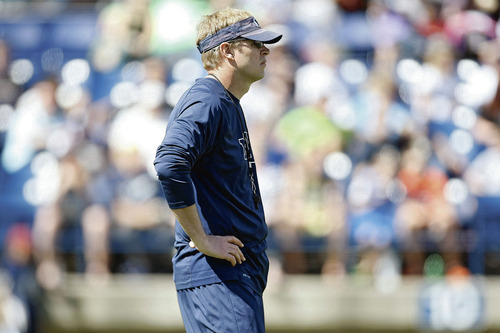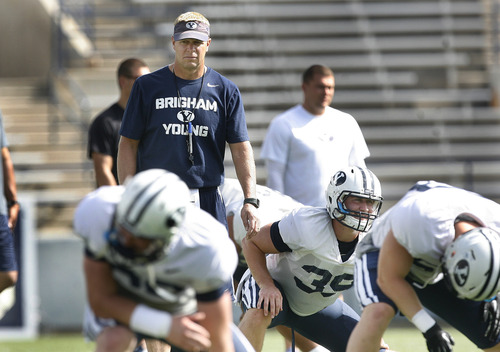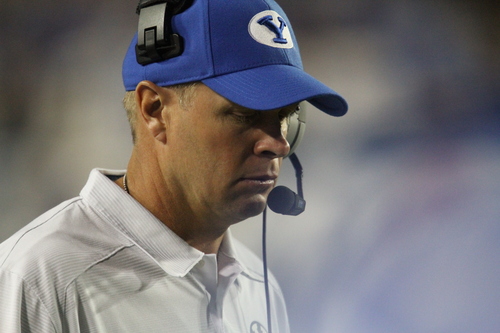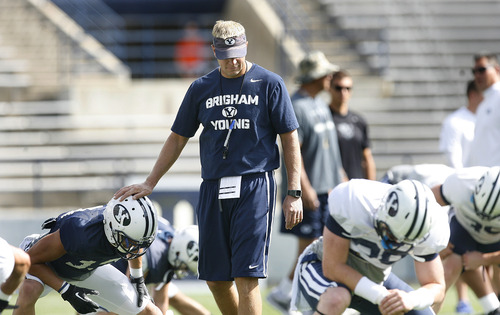This is an archived article that was published on sltrib.com in 2014, and information in the article may be outdated. It is provided only for personal research purposes and may not be reprinted.
In one setting or another, whether we were shopping for the latest in front-loading washer-and-dryer combos or a new four-pack of all-weather Michelins, we've all been on the business end of an aggressive salesman desperate to get product off the floor. Bronco Mendenhall was that sales guy, selling hard last week.
Selling BYU football.
He latched onto the leg of a writer at the Austin American-Statesman on Thursday like a schnauzer loose at the company picnic, making plain and public what BYU football has been pushing privately for months now: It wants into the Big 12 and wants in badly.
What he said and how he said it deserves further review:
"We would love to be in the Big 12," Mendenhall said. "I would love to be a member of that conference. I think that would make a lot of sense. In fact, if that was your headline, that would be great."
He continued: "We have a chip on our shoulder. I could have given you that instead of the longer answer. I'm just wondering who fights for us as an independent? Between myself and my basketball coaches, there's no two featured programs that have won more games. Our attendance is high enough. And our winning percentage is high enough.
"We have the entire Salt Lake City and Utah market as well as a worldwide following because of the church. There'd be a ton to offer the Big 12, because it's a money-generated world right now. You're talking about an amazing kind of brand. I bet I'd have the first plane ticket to whoever I have to see to present our case. How 'bout us?"
Mendenhall made a strong point. His product is Big Five-worthy.
Recent moves by the SEC and the ACC to devalue that product by not giving the same credit for its schools scheduling the Cougars as nonconference opponents in the Big Five leagues is more about power, politics and economics than it is about competitive integrity.
Without the recruiting and financial advantages of playing in one of the power leagues, BYU football already is better than a number of programs with favored status, and has been for years. Were the Cougars to play in one of those conferences, their record would suffer. But to say they do not belong, on competitive grounds, is bogus, relative to many schools that already are in.
Devaluing BYU solely for not being a Big Five team is akin to blowing off the Cougars' legs with a couple loads of buckshot and then blaming them for bleeding instead of dancing — to a point. Sometimes, they've deserved the wound. At least that's what some people in positions of power believe.
And that's BYU's real problem now.
It has an image to shed, and maybe a layer of arrogance and presumption, too.
As Brian Davis, the American-Statesman writer to whom Mendenhall made his pitch, said during a subsequent interview on 1280 AM/97.5 FM The Zone, BYU has a reputation for being difficult to deal with. It is seen as that hot-crazy love interest you had in college: attractive on so many levels, but not worth the hassle.
"If BYU really wants to get into the Big 12," Davis said, "it has to overcome the perception among Big 12 administrators that … the Sunday thing has been made out to be this gigantic obstacle that cannot be overcome. It has nothing to do with the Mormon background, the faith-based part has nothing to do with it … [but] there is a thought among Big 12 administrators that BYU is hard to work with. I'll tell you point blank, a lot of people think Texas is arrogant. Some Big 12 people think BYU is arrogant, as well. These are perceptions that have to be overcome before BYU, in my mind, gets a serious audience with people in the Big 12."
Others have whispered similar complaints. BYU wants in, but it wants in on its own terms. It wants to preserve its television rights on its own network. It won't play on Sunday, even though many LDS church members work on that day — because they sometimes don't have much of a choice.
Does BYU have a choice?
It's one of those little-big complexities: BYU uses its sports programs to gain exposure for and increase the missionary effort of the church that owns it, but without a big league format, which could require, in some cases, playing on Sunday, that exposure is not gained.
Another one: BYU invests $100 million in a television network that is available in millions of homes around the globe, and tries to provide programming for that endeavor that includes BYU football and basketball, but, on account of that, it loses millions of dollars that could otherwise be available to it via conference affiliation. Moreover, if BYU football is, in fact, devalued by the power leagues, and becomes less attractive even to Mormon sports fans, at what point does that programming become less of a draw?
The biggest questions now become: How far will the Cougars go in trying to accommodate a conference like the Big 12? Will the Big 12 come off its position of either staying with the current 10 schools or, if it does expand, moving eastward rather than toward Utah?
The answer to the first question could turn the answer to the second.
There's also the matter of geography: BYU is a thousand-plus miles away. Nothing the Cougars can do about that one.
It would be surprising if BYU ever allowed its teams to play on Sunday. It's a tenet of the religion. Despite what individual members do, or the fact that work to facilitate church activities is done on that day, including missionary efforts, stretching that angle to cover the exposure BYU sports garners in spreading the word likely has no such elasticity.
The network thing, conversely, will have to be revisited and reconfigured, and should be.
On the whole, if it wants to be included, if it wants to have any shot at being relevant as a football program, BYU must send a clear signal to the Big 12. It must be humble and hungry. Mendenhall should keep selling it hard on the showroom floor, and be willing to slash the price. The Cougars need to emphasize how hot they are, yeah, but ease up a bit on the crazy.
GORDON MONSON hosts "The Big Show" with Spence Checketts weekdays from 3-7 p.m. on 97.5 FM/1280 and 960 AM The Zone. Twitter: @GordonMonson.











